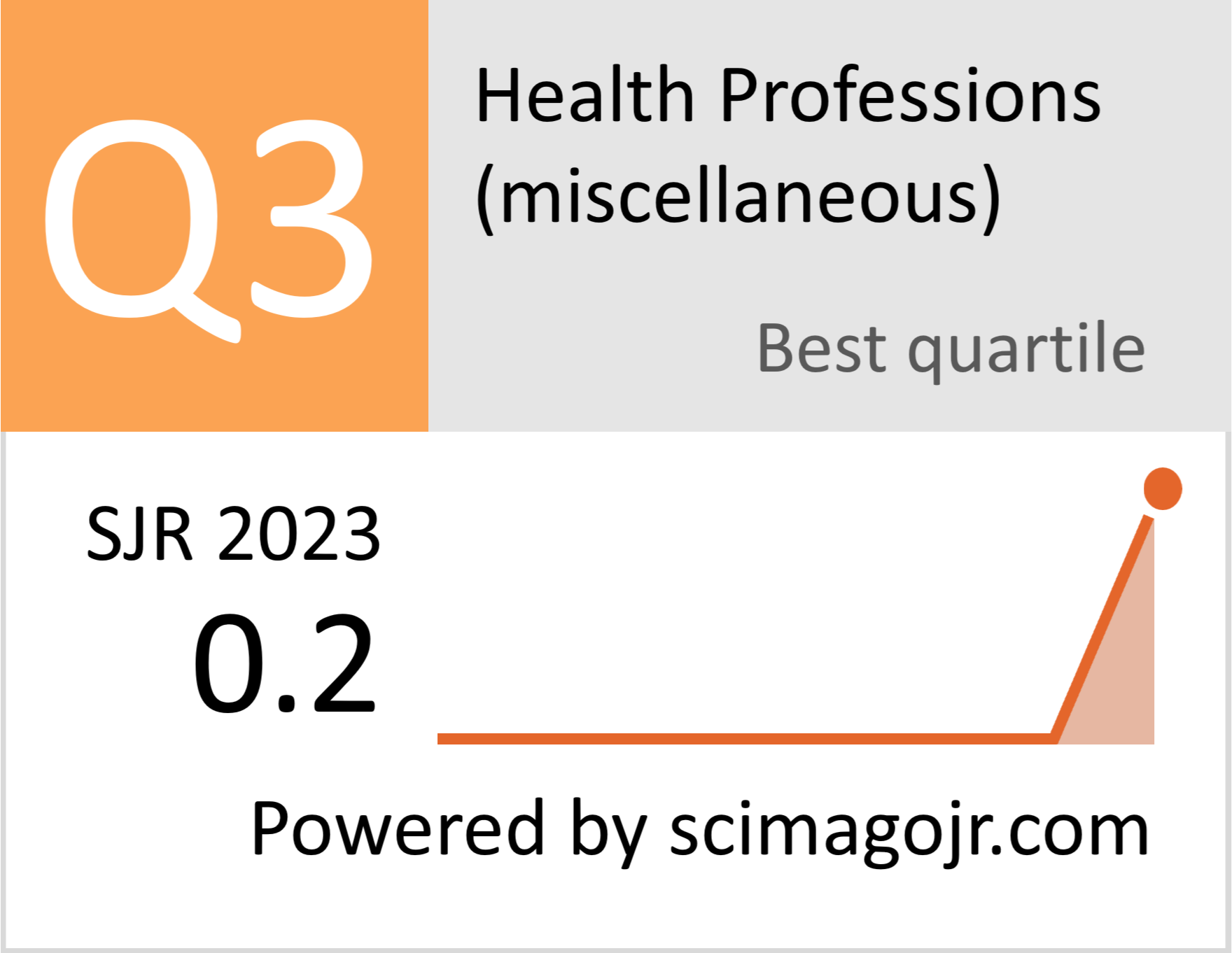Perceptions about the Institutionalization of the Elderly in Barranquilla, Colombia
Percepciones sobre la institucionalización de la persona adulta mayor en Barranquilla, Colombia

This work is licensed under a Creative Commons Attribution-NonCommercial-NoDerivatives 4.0 International License.
Show authors biography
Introduction. The global demographic growth observed in the segment of older adults poses multiple challenges for the design of well-being and public health policies in the countries, which requires introducing improvements that positively impact the quality of life of the older adult, the family and the community. The present study, a result of descriptive research, collects the perceptions related to the dilemma between living life as a family or the institutionalization of the elderly in the city of Barranquilla.
Objective. To determine the perception of the institutionalization of the elderly from the perspective of the subject and the family linked to geriatric/gerontological homes and groups of the elderly in the city.
Method. The research was carried out from a hermeneutic approach, applying semi-structured interviews to older adults and families.
Result. There is heterogeneity in the city in relation to perceptions about the way of living this stage of human development and that it is closely related to aspects such as health, economy, family functionality, and the surrogate care as a social phenomenon linked to family migration.
Conclusion. The topic raises challenges to be faced in Colombia and the world when it comes to aging, especially in the context of poverty, family dysfunction and inequality. The causes and consequences of the institutionalization of the elderly are defined, as well as the alternatives of family and social care, exploring the cultural and demographic characteristics that influence the situation of the elderly in the country.
Article visits 841 | PDF visits 356
- Organización Mundial de la Salud. Envejecimiento y salud [Internet]. 2022 Oct 1. Disponible en: https://www.who.int/es/news-room/fact-sheets/detail/ageing-and-health
- Huenchuan S, editora. Envejecimiento, personas mayores y Agenda 2030 para el Desarrollo Sostenible: perspectiva regional y de derechos humanos [Internet]. Santiago: CEPAL; 2018. 251 p. Disponible en: https://hdl.handle.net/11362/44369
- OECD. Pensions at a Glance 2021: OECD and G20 Indicators [Internet]. París: OECD Publishing; 2021. 222 p. Disponible en: https://doi.org/10.1787/ca401ebd-en
- Organización Mundial de la Salud. Informe mundial sobre el envejecimiento y la salud [Internet]. Estados Unidos: Organización Mundial de la Salud; 2015. 267 p. Disponible en: https://www.who.int/es/publications/i/item/9789241565042
- Comisión Económica para América Latina y el Caribe (CEPAL). CEPAL: envejecimiento provocará la caída de la población de América Latina y el Caribe hacia 2060 [Internet]. 2017 Jun 22. Disponible en: https://www.cepal.org/es/comunicados/cepal-envejecimiento-provocara-caida-la-poblacion-america-latina-caribe-2060
- Robles L, Pérez A del C. Expectativas sobre la obligación filial: comparación de dos generaciones en México. Rev latinoam cienc soc niñez juv [Internet]. 2012;10(1):527-40. Disponible en: https://revistaumanizales.cinde.org.co/rlcsnj/index.php/Revista-Latinoamericana/article/view/623
- Aldana-González G, García-Gómez L. La experiencia de ser cuidadora de un anciano con enfermed crónica. Aquichan [Internet]. 2011;11(2):158-72. doi: https://doi.org/10.5294/aqui.2011.11.2.3
- Organización Mundial de la Salud. Discapacidad [Internet]. 2023 Mar 7. Disponible en: https://www.who.int/es/news-room/fact-sheets/detail/disability-and-health
- Martín-Crespo MC, Salamanca AB. El muestreo en la investigación cualitativa. Nure Investig [Internet]. 2007;27:1-4. Disponible en: https://www.nureinvestigacion.es/OJS/index.php/nure/article/view/340
- Callejo J. Daniel Berteaux. Los relatos de vida. Perspectiva etnosociológica. Barcelona, Ediciones Bellaterra, 2005. EMP [Internet]. 2006;11:225-27. doi: https://doi.org/10.5944/empiria.11.2006.1115
- Oliveri ML. Pensiones sociales y pobreza en América Latina. Apuntes [Internet]. 2016 May 27;43(78):121-57. doi: https://doi.org/10.21678/apuntes.78.848
- Altamirano Montoya A , Berstein S, Bosch M, García-Huitrón M, Oliveri ML. Presente y futuro de las pensiones en América Latina y el Caribe [Internet]. Banco Interamericano de desarrollo; 2018. 126 p. doi: http://dx.doi.org/10.18235/0001307
- Cerquera Córdoba AM, Galvis Aparicio MJ, Cala Rueda ML. Amor, sexualidad e inicio de nuevas relaciones en la vejez: percepción de tres grupos etarios. Psychol Av discip [Internet]. 2012 Jul 1;6(2):73-81. Disponible en: https://revistas.usb.edu.co/index.php/Psychologia/article/view/1185
- Ley 1850 de 2017. Diario Oficial No. 50.299 (Jul 19, 2017). Disponible en: http://www.secretariasenado.gov.co/senado/basedoc/ley_1850_2017.html
- Jaramillo AM. Institucionalidad Pública para el Envejecimiento y las formas de organización residencial. Pap polit [Internet]. 2018 Sep 28;23(1):35-90. doi: https://doi.org/10.11144/Javeriana.papo23-1.ipef
- Creagh M. Repercusión del envejecimiento en el funcionamiento familiar. Rev Cub Salud Publica [Internet]. 2019;45(4):1-15. Disponible en: https://revsaludpublica.sld.cu/index.php/spu/article/view/1317
- Meza-Mejía M, Villalobos-Torres EM. La crisis de la jubilación como una oportunidad educativa. Educ educ [Internet]. 2008;11(2):179-90. Disponible en: https://educacionyeducadores.unisabana.edu.co/index.php/eye/article/view/738
- Comisión Económica para América Latina y el Caribe (CEPAL). Informe sobre la Terecera Conferencia Regional Intergubernamental sobre Envejecimiento en América Latina y el Caribe. San José, 8 a 11 de mayo de 2012. CEPAL; 2012 Sep 27. LC/L.3526 27. 49 p. Disponible en: https://hdl.handle.net/11362/21624
- Aguilar M, Toledo M. Cuidado no remunerado y envejecimiento: un análisis sobre los arreglos domésticos y la reproducción social en Tlaxcala. Tla-melaua [Internet]. 2019;(46):170-89. Disponible en: http://www.apps.buap.mx/ojs3/index.php/tlamelaua/article/view/508
- Klein A. La necesidad de cuidar de aquellos que solían necesitar ser cuidados: Vejez y tendencias familiares-demográficas. Cult representaciones soc [Internet]. 2015;10(19):128-53. Disponible en: https://www.culturayrs.unam.mx/index.php/CRS/article/view/393
- Álvarez-Caicedo LV, Cala K, Riaño-Garzón M, Hernández-Lalinde J, Díaz-Camargo E. Estilos de personalidad de abuelos cuidadores y prácticas de crianza utilizadas con sus nietos. AVFT [Internet]. 2019;38(5):648-52. Disponible en: http://saber.ucv.ve/ojs/index.php/rev_aavft/article/view/17436
- Ministerio de Salud y Protección Social de Colombia. Minsalud actualiza política de envejecimiento y vejez [Internet]. 2021 Oct 16. Disponible en: https://www.minsalud.gov.co/Paginas/Minsalud-actualiza-politica-de-envejecimiento-y-vejez.aspx
- Decreto 681 de 2022. Diario Oficial No. 52.022 (May 2, 2022). Disponible en: https://www.minsalud.gov.co/Normatividad_Nuevo/Decreto%20No.%20681%20de%202022.pdf



